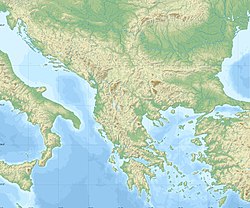Patras
Πάτρα | |
|---|---|
 Clockwise from top: Panoramic view of downtown: Trion Symmachon square and Dock (molos) area from Agiou Nikolaou Stairs, Rio-Antirio Bridge and Gulf of Corinth, Lighthouse of Patras, Night view of Patras from Romanos Mona Forest Park, Apollon Theatre and Georgiou I Square, Castle of Patras. | |
| Coordinates: 38°15′N 21°44′E / 38.250°N 21.733°E | |
| Country | |
| Geographic region | Peloponnese |
| Administrative region | Western Greece |
| Regional unit | Achaia |
| Districts | 5 |
| Government | |
| • Type | Mayor–council government |
| • Mayor | Kostas Peletidis[1] (KKE) |
| Area | |
| • Municipality | 334.9 km2 (129.3 sq mi) |
| • Urban | 125.4 km2 (48.4 sq mi) |
| Highest elevation | 10 m (30 ft) |
| Lowest elevation | 0 m (0 ft) |
| Population (2021) | |
| • Municipality | 215,922 |
| • Urban | 173,600 |
| • Urban density | 1,400/km2 (3,600/sq mi) |
| • Metro | 305,979[2] |
| Demonym | Patrinos (Greek: Πατρινός) |
| Time zone | UTC+2 (EET) |
| • Summer (DST) | UTC+3 (EEST) |
| Postal codes | 26x xx |
| Telephone | 261 |
| Vehicle registration | ΑXx, ΑZx, AOx, AYx |
| Patron saint | Saint Andrew (30 November) |
| Website | www.e-patras.gr |
Patras (Greek: Πάτρα, romanized: Pátra pronounced [ˈpatra] ; Katharevousa and Ancient Greek: Πάτραι;[a] Latin: Patrae[b]) is Greece's third-largest city and the regional capital and largest city of Western Greece, in the northern Peloponnese, 215 km (134 mi) west of Athens. The city is built at the foot of Mount Panachaikon, overlooking the Gulf of Patras.
As of the 2021 census, the municipality of Patras has a population of 215,922, while the urban population is 173,600. The core settlement has a history spanning four millennia. In the Roman period, it had become a cosmopolitan center of the eastern Mediterranean whilst, according to the Christian tradition, it was also the place of Saint Andrew's martyrdom.
Dubbed as Greece's 'Gate to the West', Patras is a commercial hub, while its busy port is a nodal point for trade and communication with Italy and the rest of Western Europe. The city has three public universities, hosting a large student population and rendering Patras an important scientific centre[3] with a field of excellence in technological education. The Rio-Antirrio Bridge connects Patras' easternmost suburb of Rio to the town of Antirrio, connecting the Peloponnese peninsula with mainland Greece.
Every year, in February, the city hosts one of Europe's largest carnivals. Notable features of the Patras Carnival include its mammoth satirical floats and balls and parades, enjoyed by hundreds of thousands of visitors in a Mediterranean climate. Patras is also famous for supporting an indigenous cultural scene active mainly in the performing arts and modern urban literature. It was European Capital of Culture in 2006.[4]
- ^ Municipality of Patras, Municipal elections – October 2023, Ministry of Interior
- ^ "Eurostat – Data Explorer". appsso.eurostat.ec.europa.eu. Archived from the original on 1 November 2016. Retrieved 10 February 2021.
- ^ S.L.U, Course Guru. "Όλα τα 3 Πανεπιστήμια σε Πάτρα | Κατατάξεις & Αξιολογήσεις 2023". UniversityGuru (in Greek). Archived from the original on 14 June 2023. Retrieved 14 June 2023.
- ^ Mansfield, Paul (29 January 2006). "Party town gets a culture kick". The Guardian. Archived from the original on 18 May 2017. Retrieved 6 September 2017.
Cite error: There are <ref group=lower-alpha> tags or {{efn}} templates on this page, but the references will not show without a {{reflist|group=lower-alpha}} template or {{notelist}} template (see the help page).




